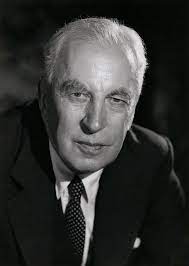Toynbee, Arnold Joseph

Bio: (1889-1975) British historian. Arnold Toynbee studied at Oxford and taught at several British universities. The period he spent at the London School of Economics was the most fruitful. After a thorough study of several historical civilizations, of which he paid the most attention to ancient Greece, Toynbee began writing his monumental work, The Study of History, which was published in 12 volumes between 1934 and 1961. In this book, Toynbee presented universal history - a theoretical but also a theological-philosophical idea of the process of origin, development, and decay that every civilization must go through.
He believes that the wrong approach to the study of history is to focus attention on individual nation-states. Analysis at the level of the nation-state, cannot adequately investigate external influences that had a key deterministic force in shaping society and historical changes, and therefore, long-term processes cannot be adequately understood. Instead, individual civilizations should be taken as units of analysis because civilization represents the lowest level at which human behavior can be fully understood, as well as historical changes. In his research, Toynbee determined that during the history of the whole world, a total of twenty-one separate civilizations were created, of which only seven still exist.
All civilizations must go through periods of growth, decline, dissolution, and collapse. For the whole logic of the process of life of civilization, the most important thing is to understand the mechanism of "challenge and response". Before a civilization is born, the most important challenge is the physical environment. When the challenge of the physical environment is too strong, human energy and creativity will not be enough to create a civilization in response. If the challenge is too weak, it will not require the engagement of energy and creativity necessary for the creation of civilization. This means that special challenges of the environment are needed for a civilization to emerge in response to it.
"Creative minorities" are those who create the type of response necessary for the emergence of civilization. The creative minority consists of exceptional individuals who have great creative power in various spheres - economy, religion, politics, technology, science, and art. Due to the huge contribution of the creative minority to the emergence and development of civilization, the masses are beginning to follow it voluntarily and express admiration and awe for it. In the periods of growth of civilization, there is a "process of etherealization". Etherealization represents the progressive improvement of creative potential by eliminating unnecessary elements, which leads to increased control over society and culture.
When the creative minority begins to lose its creative and spiritual energy, this minority is transformed into a "dominant minority", which bases its power only on pure force. The dominant minority creates a "universal state" that serves only as a means of domination. These changes lead to periods of trouble - class struggles, local conflicts, wars between different states within one civilization or wars between civilizations, demoralization, and mental problems in the general population. In these periods the destructive action of the "internal" and "external proletariat" took place. The internal proletariat consists of economically and politically deprived parts of the population within civilization, while the external proletariat consists of people who are in contact with civilization but are in a subordinate relationship to civilization. The internal proletariat creates a "universal" religion and church in order to oppose the dominant minority, while the external proletariat strives to introduce its own cultural patterns into civilization. If the internal or external proletariat succeeds in overthrowing the dominant minority, ecumenical religion and external influences will be accepted.
All this inevitably leads to the collapse of the state through a series of fractures, which were followed by short periods of recovery, but the final epilogue is certainly the collapse of civilization. The decline of civilization can be temporarily prevented when an exceptional individual comes back from a retreat to regenerate civilization. Isolation from the external environment allows that exceptional individual to experience spiritual, moral, and creative regeneration. The regenerated leader then returns to civilization and inspires the great masses to follow him and experience moral rebirth. However, even this process does not enable the prevention of the final collapse of civilization.
Fields of research
Art Church Civilization Conflict Control, Social Crowd Culture Domination History Leaders Morality Religion State WarTheoretical approaches
Cyclical Theories of Society (Social Cycle Theory)Main works
Nationality and the War (1915);
A Study of History, 12 vols. (1934-1961);
Civilization on Trial (1948);
The World and the West (1953);
An Historian's Approach to Religion (1956).
Democracy in the Atomic Age (1957);
America and the World Revolution (1962).

